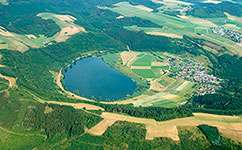Sudden climate change varies from country to country

Different countries may have recovered faster than others as the last Ice Age ended, new research shows.
The study, published in Geology, shows that 12,100 years ago, as the last ice age ended, Germany's climate began to recover 120 years before Norway's climate.
The team studied Lake Meerfelder Maar in Germany, which has clear sediment layers representing different seasons.
"The annually laminated sediments give us a really nice record of climate change since the last ice age," explains Dr Christine Lane of the University of Oxford, lead author on the study. "They form on a seasonal basis, like tree rings, so you can count back and determine when they formed."
Lane and her colleagues, from Oxford, GFZ Potsdam and Royal Holloway, University of London, found a small band of volcanic ash in the layers, from an eruption of Iceland's Katla volcano.
This ash could be used as a time reference point. Since they knew when the eruption occurred, they could date the layers much more accurately than if they just counted back from the surface.
"The ash layer is found 100 layers, or 100 years, before we see a shift in climate that took place in the Younger Dryas – a 1000 year cold period at the end of the last Ice Age. It has also been found in Norway, at Lake Kråkenes, but there we see the same transition takes place 20 years after the ash layer," says Lane.

The shift in climate is believed to represent the gradual recession of the polar front - the boundary where cool air from the poles and warm air from the tropics meets - as Europe warmed.
Lane says that discovering the 120-year offset between the two sites proves how important it is for researchers not to assume such events must have happened at the same time everywhere.
"We can't assume climatic changes are synchronous worldwide, or even continent-wide. Some regions might feel changes in climate at different times," says Lane. "Climate models need to be able to handle subtle complexities in timing to give accurate future climate predictions."
More information: Lane, C. et al. (2013) Volcanic ash reveals time-transgressive abrupt climate change during the Younger Dryas, Geology.
Journal information: Geology
Provided by PlanetEarth Online
This story is republished courtesy of Planet Earth online, a free, companion website to the award-winning magazine Planet Earth published and funded by the Natural Environment Research Council (NERC).



















